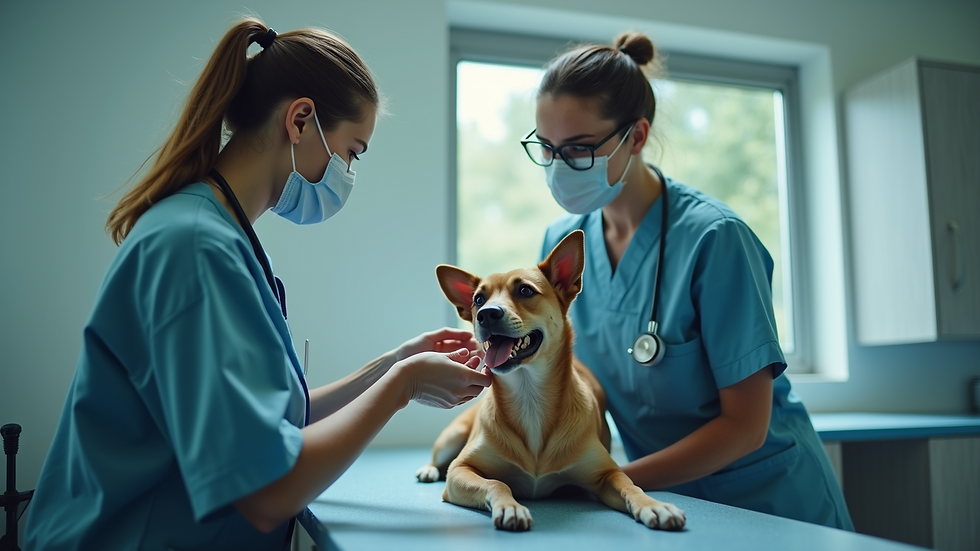Best Practices for Managing Your Pet's Health
- Furever Products

- Mar 29, 2025
- 4 min read
Owning a pet is a rewarding experience filled with unconditional love and companionship. However, it also comes with the responsibility of ensuring their health and well-being. Keeping your pet healthy requires a proactive approach to their care. This guide outlines best practices for managing your pet's health effectively.
Understanding Pet Health
Pet health encompasses a range of areas, from maintaining physical fitness to ensuring proper nutrition. Just like humans, pets require regular check-ups, vaccinations, and a balanced diet for optimal health. Pet owners must understand the importance of preventative care in prolonging their pets' lives. The American Pet Products Association reports that pet owners are increasingly willing to invest in their pets' health, with spending on veterinary care surpassing $30 billion annually in the United States alone.

Regular Veterinary Check-ups
One of the most important aspects of managing your pet's health is scheduling regular veterinary check-ups. These visits allow for early detection of potential health issues. Even if your pet appears healthy, routine exams can uncover concerns before they become serious.
During a check-up, the veterinarian will evaluate your pet's overall health, including weight, dental health, and vaccinations. Vaccines protect against common diseases like rabies and parvovirus, which can be fatal. It is advisable to consult with your veterinarian on the recommended vaccination schedule for your pet's specific needs.

Nutrition and Diet for Optimal Pet Health
Diet plays a crucial role in maintaining your pet's health. A balanced diet provides essential nutrients and supports overall well-being. Choosing the right food is vital, as different pets have different nutritional requirements based on their age, weight, and activity level.
When selecting pet food, look for a product that meets the standards set by the Association of American Feed Control Officials (AAFCO). Naturally, you'll want to avoid foods with excessive fillers, artificial colors, or preservatives. Ingredients should include high-quality proteins, grains, and healthy fats.
For pets with specific dietary needs, consult your veterinarian for recommendations tailored to their health. It's essential to monitor portion sizes and avoid overfeeding, which can lead to obesity—a significant health issue among pets.

Does Zymox Cure Ear Infections?
Ear infections are a common issue in pets, particularly those with floppy ears or those that swim often. Symptoms can include shaking the head, scratching at the ears, and a foul odor. Managing ear infections promptly is vital to prevent pain and further complications.
One effective solution for ear infections is the use of products like zymox. Zymox is formulated to help alleviate symptoms associated with ear infections and maintain ear health. It's essential to follow the product's instructions and consult your vet if your pet shows signs of a severe infection.
In addition to using treatments like Zymox, regular ear cleaning can help prevent infections. Use a vet-recommended ear cleaner that is gentle and effective.
Exercise and Mental Stimulation
Just like a balanced diet, regular exercise is critical to your pet's health. Exercise helps maintain a healthy weight, improves cardiovascular health, and reduces behavioral issues. Depending on the type of pet you have, different exercise routines may be necessary.
For dogs, daily walks, runs, or play sessions can provide not only physical activity but also socialization and mental stimulation. For cats, engaging in play with toys can offer much-needed exercise and help satisfy their hunting instincts.
Incorporating mental challenges into your pet's routine is also essential. Puzzle toys, training sessions, and varied activities keep their minds engaged and reduce destructive behaviors.
Grooming and Hygiene
Grooming is often overlooked but plays a vital role in your pet's health. Regular grooming helps prevent matting, reduces shedding, and keeps their skin healthy. Depending on the breed, pets like dogs may require specific grooming techniques, such as regular brushing, trimming, and bathing.
Nail trimming is also essential to prevent pain and complications. Long nails can lead to difficulty walking and increased risk of injury. Regular dental care is equally important, as oral health directly affects your pet's overall well-being. Consider brushing your pet's teeth or providing dental treats designed to reduce plaque buildup.
Keeping your pet clean and well-groomed reduces the risk of skin infections and other health issues, contributing to their overall quality of life.
Watch for Changes in Behavior or Health
As a pet owner, you know your furry friend better than anyone. Pay attention to any changes in behavior, appetite, or energy levels. Sudden changes may indicate a health issue that requires immediate attention.
Common signs that your pet may need veterinary care include:
Persistent vomiting or diarrhea
Changes in appetite or drinking habits
Lethargy or decreased activity levels
Unusual vocalizations or agitation
Early detection of health issues can lead to more effective treatment, so make it a habit to observe and document any concerning changes.
Keeping Records of Pet Health Information
Maintaining organized records of your pet's health information can simplify managing their health. Keep track of their vaccination history, medications, dietary changes, and veterinary visits. This information is valuable for your veterinarian to provide the best care possible.
You might consider creating a spreadsheet or using a dedicated app for pet health management. The system allows you to monitor vaccinations, appointments, and treatment schedules efficiently, ensuring you never miss an important deadline.
Final Thoughts on Managing Your Pet's Health
Managing your pet's health requires regular check-ups, proper nutrition, and proactive measures to prevent health issues. By implementing these best practices, you can significantly enhance your pet's quality of life.
Be attentive to their needs, offer them love and care, and you'll enjoy a wonderful, healthy life together. Remember, your pet's health is a journey, not a destination. It is essential to stay informed and adapt as your pet ages and their needs change.







Comments